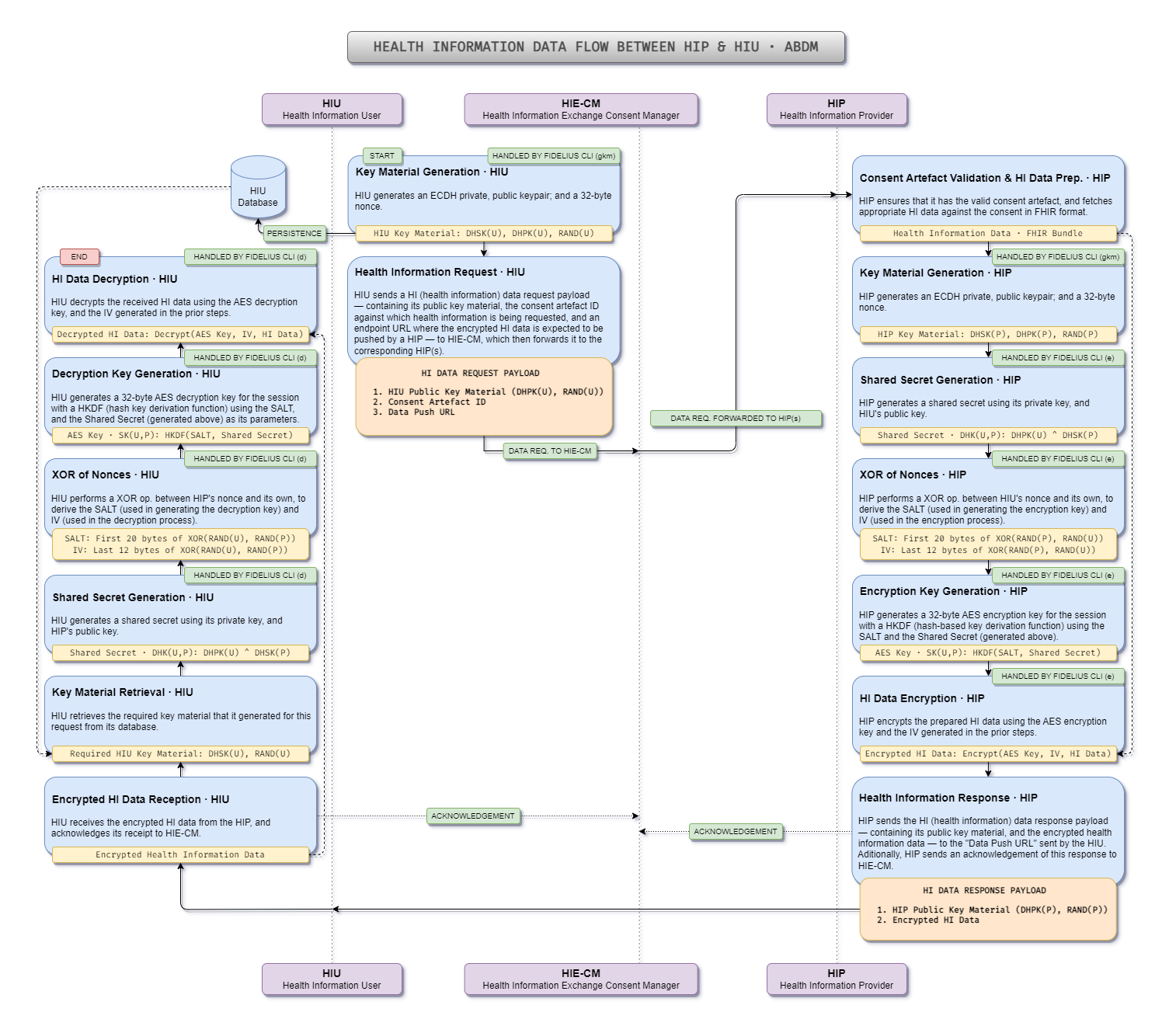Fidelius CLI
Fidelius CLI is a specialized command-line interface (CLI) tool designed for ECDH cryptography. It is based on Curve25519 and incorporates a custom HMAC-based Key Derivation Function, enabling the generation of AES-GCM keys for data encryption and decryption.
While Fidelius CLI can be used for various end-to-end encryption needs, its primary purpose is to secure health data within the ABDM ecosystem. ABDM stands for Ayushman Bharat Digital Mission, an initiative by the Indian Government to establish a nationwide digital infrastructure supporting integrated digital health services.
The diagram below provides a visual representation of the health data flow between a Health Information User and a Health Information Provider, who play vital roles in the ABDM system. The encryption and decryption steps in the flowchart are appropriately labeled as “HANDLED BY FIDELIUS CLI” to indicate the involvement of Fidelius CLI in these processes.
For more detailed information on the technical foundations and protocols involved in encrypting and decrypting FHIR data within the ABDM ecosystem, you can refer to this comprehensive guide.
Usage
A pre-built release can be downloaded from here. Please ensure that JRE 1.8+ is installed, to run the binaries in the release.
Fidelius CLI works with the following commands
generate-key-material(orgkm) · Thegenerate-key-materialcommand generates an ECDH key pair, and a random nonce.
$ ./fidelius-cli gkmencrypt(ore) · Theencryptcommand takes the following additional arguments.
$ ./fidelius-cli e\ <string-to-encrypt>\ <sender-nonce>\ <requester-nonce>\ <sender-private-key>\ <requester-public-key>\;sane-encrypt(orse) · Thesane-encryptcommand behaves identically to the encrypt command, with the only difference being that it accepts base64 encoded version of the input string. Fidelius would decode this base64 value to the original string, before encrypting it. This is available to circumvent the need to escape special characters in strings (e.g. JSON values).
$ ./fidelius-cli se\ <string-to-encrypt-base64-encoded>\ <sender-nonce>\ <requester-nonce>\ <sender-private-key>\ <requester-public-key>\;decrypt(ord) · Thedecryptcommand takes the following additional arguments.
$ ./fidelius-cli d\ <encrypted-data>\ <requester-nonce>\ <sender-nonce>\ <requester-private-key>\ <sender-public-key>\;--filepath(or-f) · The--filepathflag can be used to provide the CLI its parameters (command and the subsequent arguments) from a text file. This can be used as a workaround to the Windows’ terminals’ “This command is too long” (>8192 characters) limitation in case of long input strings.
$ ./fidelius-cli -f /path/to/params/file.txtThe following set of commands demonstrate an example for the usage of the above commands.
Key Material Generation
$ cd fidelius-cli-1.x.x/bin
$ ./fidelius-cli gkm
{
"privateKey": "DMxHPri8d7IT23KgLk281zZenMfVHSdeamq0RhwlIBk=",
"publicKey": "BAheD5rUqTy4V5xR4/6HWmYpopu5CO+KO8BECS0udNqUTSNo91TIqIIy1A4Vh+F94c+n9vAcwXU2bGcfsI5f69Y=",
"x509PublicKey": "MIIBMTCB6gYHKoZIzj0CATCB3gIBATArBgcqhkjOPQEBAiB/////////////////////////////////////////7TBEBCAqqqqqqqqqqqqqqqqqqqqqqqqqqqqqqqqqqqqYSRShRAQge0Je0Je0Je0Je0Je0Je0Je0Je0Je0Je0JgtenHcQyGQEQQQqqqqqqqqqqqqqqqqqqqqqqqqqqqqqqqqqqqqqqq0kWiCuGaG4oIa04B7dLHdI0UySPU1+bXxhsinpxaJ+ztPZAiAQAAAAAAAAAAAAAAAAAAAAFN753qL3nNZYEmMaXPXT7QIBCANCAAQIXg+a1Kk8uFecUeP+h1pmKaKbuQjvijvARAktLnTalE0jaPdUyKiCMtQOFYfhfeHPp/bwHMF1NmxnH7COX+vW",
"nonce": "6uj1RdDUbcpI3lVMZvijkMC8Te20O4Bcyz0SyivX8Eg="
}
Let’s suppose the above output represents the generated key material of the requester.
$ ./fidelius-cli gkm
{
"privateKey": "AYhVZpbVeX4KS5Qm/W0+9Ye2q3rnVVGmqRICmseWni4=",
"publicKey": "BABVt+mpRLMXiQpIfEq6bj8hlXsdtXIxLsspmMgLNI1SR5mHgDVbjHO2A+U4QlMddGzqyEidzm1AkhtSxSO2Ahg=",
"x509PublicKey": "MIIBMTCB6gYHKoZIzj0CATCB3gIBATArBgcqhkjOPQEBAiB/////////////////////////////////////////7TBEBCAqqqqqqqqqqqqqqqqqqqqqqqqqqqqqqqqqqqqYSRShRAQge0Je0Je0Je0Je0Je0Je0Je0Je0Je0Je0JgtenHcQyGQEQQQqqqqqqqqqqqqqqqqqqqqqqqqqqqqqqqqqqqqqqq0kWiCuGaG4oIa04B7dLHdI0UySPU1+bXxhsinpxaJ+ztPZAiAQAAAAAAAAAAAAAAAAAAAAFN753qL3nNZYEmMaXPXT7QIBCANCAAQAVbfpqUSzF4kKSHxKum4/IZV7HbVyMS7LKZjICzSNUkeZh4A1W4xztgPlOEJTHXRs6shInc5tQJIbUsUjtgIY",
"nonce": "lmXgblZwotx+DfBgKJF0lZXtAXgBEYr5khh79Zytr2Y="
}
Let’s suppose the above output represents the generated key material of the sender.
It is generally recommended to use the publicKey field, which represents the base64 encoding of the uncompressed EC public key, for all encryption and decryption operations. However, it is important to note that certain HIUs only accept the public key in the base64-encoded X.509 format, specifically within the key material sent by the HIP, before decryption.
To obtain the X.509 public key, you can utilize the x509PublicKey field available in the output of the gkm command provided by Fidelius CLI. Both the base64-encoded X.509 and the base64-encoded uncompressed public key formats can be used interchangeably with the encrypt and decrypt commands of Fidelius CLI, accommodating the requirements of different HIUs.
Encryption
Note that the e (encrypt) command also accepts the <requester-public-key> (the last argument) in X.509 standard.
$ ./fidelius-cli e\
"Wormtail should never have been the Potter cottage's secret keeper."\
lmXgblZwotx+DfBgKJF0lZXtAXgBEYr5khh79Zytr2Y=\
6uj1RdDUbcpI3lVMZvijkMC8Te20O4Bcyz0SyivX8Eg=\
AYhVZpbVeX4KS5Qm/W0+9Ye2q3rnVVGmqRICmseWni4=\
BAheD5rUqTy4V5xR4/6HWmYpopu5CO+KO8BECS0udNqUTSNo91TIqIIy1A4Vh+F94c+n9vAcwXU2bGcfsI5f69Y=\;
{
"encryptedData": "pzMvVZNNVtJzqPkkxcCbBUWgDEBy/mBXIeT2dJWI16ZAQnnXUb9lI+S4k8XK6mgZSKKSRIHkcNvJpllnBg548wUgavBa0vCRRwdL6kY6Yw=="
}
Decryption
Note that the d (decrypt) command also accepts the <sender-public-key> (the last argument) in X.509 standard.
$ ./fidelius-cli d\
pzMvVZNNVtJzqPkkxcCbBUWgDEBy/mBXIeT2dJWI16ZAQnnXUb9lI+S4k8XK6mgZSKKSRIHkcNvJpllnBg548wUgavBa0vCRRwdL6kY6Yw==\
6uj1RdDUbcpI3lVMZvijkMC8Te20O4Bcyz0SyivX8Eg=\
lmXgblZwotx+DfBgKJF0lZXtAXgBEYr5khh79Zytr2Y=\
DMxHPri8d7IT23KgLk281zZenMfVHSdeamq0RhwlIBk=\
BABVt+mpRLMXiQpIfEq6bj8hlXsdtXIxLsspmMgLNI1SR5mHgDVbjHO2A+U4QlMddGzqyEidzm1AkhtSxSO2Ahg=\;
{
"decryptedData": "Wormtail should never have been the Potter cottage's secret keeper."
}
The --filepath flag
With the --filepath flag, the arguments to the CLI can be specified in a file, one argument per line. The CLI will read the file and parse the arguments in order.
$ cat /path/to/example-params.txt
d
pzMvVZNNVtJzqPkkxcCbBUWgDEBy/mBXIeT2dJWI16ZAQnnXUb9lI+S4k8XK6mgZSKKSRIHkcNvJpllnBg548wUgavBa0vCRRwdL6kY6Yw==
6uj1RdDUbcpI3lVMZvijkMC8Te20O4Bcyz0SyivX8Eg=
lmXgblZwotx+DfBgKJF0lZXtAXgBEYr5khh79Zytr2Y=
DMxHPri8d7IT23KgLk281zZenMfVHSdeamq0RhwlIBk=
BABVt+mpRLMXiQpIfEq6bj8hlXsdtXIxLsspmMgLNI1SR5mHgDVbjHO2A+U4QlMddGzqyEidzm1AkhtSxSO2Ahg=
The above example can be executed as follows:
$ ./fidelius-cli --filepath /path/to/example-parms.txt
{
"decryptedData": "Wormtail should never have been the Potter cottage's secret keeper."
}
Using Fidelius CLI with other Programming Languages
While Fidelius CLI is a Java implementation, the ./examples folder in the corresponding repository can be perused for guidance on integrating Fidelius CLI (achieved by invoking the binary as a subprocess) in Node JS, Python, Ruby, and PHP codebases.
The above examples can be run using the following commands:
$ node examples/node/index.js
$ python3 examples/python/main.py
$ ruby examples/ruby/main.rb
$ php examples/php/index.php
